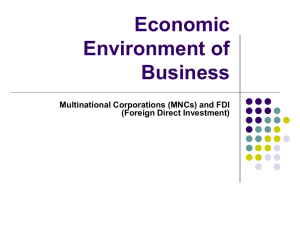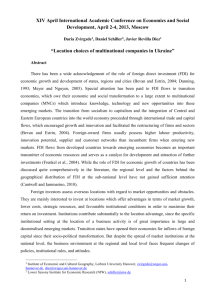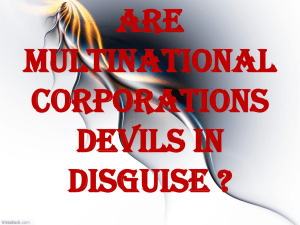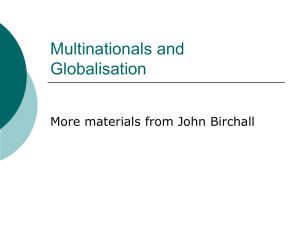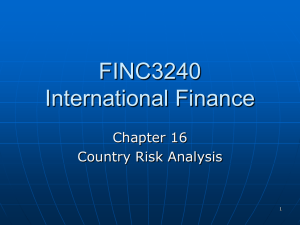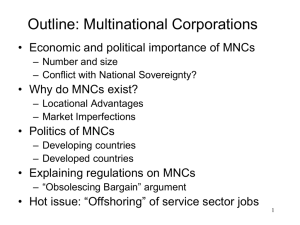TOPIC 2 INTERNATIONAL FINANCIAL MARKETS
advertisement
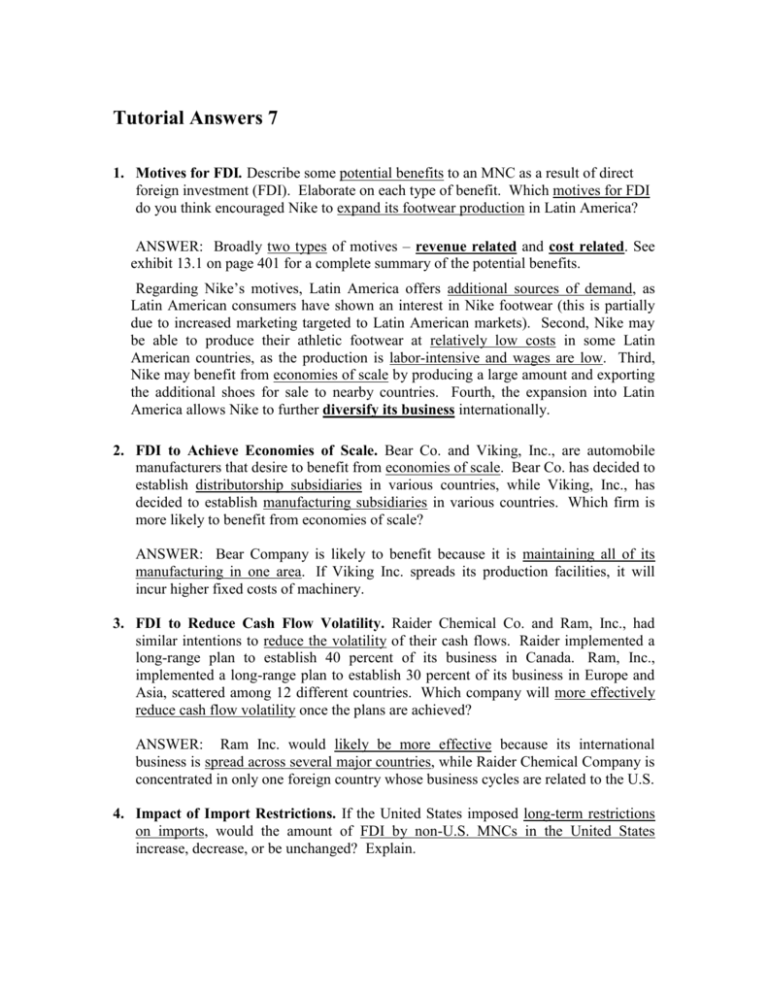
Tutorial Answers 7 1. Motives for FDI. Describe some potential benefits to an MNC as a result of direct foreign investment (FDI). Elaborate on each type of benefit. Which motives for FDI do you think encouraged Nike to expand its footwear production in Latin America? ANSWER: Broadly two types of motives – revenue related and cost related. See exhibit 13.1 on page 401 for a complete summary of the potential benefits. Regarding Nike’s motives, Latin America offers additional sources of demand, as Latin American consumers have shown an interest in Nike footwear (this is partially due to increased marketing targeted to Latin American markets). Second, Nike may be able to produce their athletic footwear at relatively low costs in some Latin American countries, as the production is labor-intensive and wages are low. Third, Nike may benefit from economies of scale by producing a large amount and exporting the additional shoes for sale to nearby countries. Fourth, the expansion into Latin America allows Nike to further diversify its business internationally. 2. FDI to Achieve Economies of Scale. Bear Co. and Viking, Inc., are automobile manufacturers that desire to benefit from economies of scale. Bear Co. has decided to establish distributorship subsidiaries in various countries, while Viking, Inc., has decided to establish manufacturing subsidiaries in various countries. Which firm is more likely to benefit from economies of scale? ANSWER: Bear Company is likely to benefit because it is maintaining all of its manufacturing in one area. If Viking Inc. spreads its production facilities, it will incur higher fixed costs of machinery. 3. FDI to Reduce Cash Flow Volatility. Raider Chemical Co. and Ram, Inc., had similar intentions to reduce the volatility of their cash flows. Raider implemented a long-range plan to establish 40 percent of its business in Canada. Ram, Inc., implemented a long-range plan to establish 30 percent of its business in Europe and Asia, scattered among 12 different countries. Which company will more effectively reduce cash flow volatility once the plans are achieved? ANSWER: Ram Inc. would likely be more effective because its international business is spread across several major countries, while Raider Chemical Company is concentrated in only one foreign country whose business cycles are related to the U.S. 4. Impact of Import Restrictions. If the United States imposed long-term restrictions on imports, would the amount of FDI by non-U.S. MNCs in the United States increase, decrease, or be unchanged? Explain. ANSWER: It would likely increase because the foreign firms would need to replace their exporting business with FDI in order to maintain their business in the U.S. [note: The US is a big consumer market, which suggests that foreign companies wanting to sell there will be able to justify the cost of FDI in the US. If the country imposing import restrictions were to be a small country with an insignificant domestic market, it is likely that MNCs would simply ignore that country in the future. ] 5. Capitalizing on Low-Cost Labor. Some MNCs establish a manufacturing facility where there is a relatively low cost of labor. Yet, they sometimes close the facility later because the cost advantage dissipates. Why do you think the relative cost advantage of these countries is reduced over time? (Ignore possible exchange rate effects.) ANSWER: As MNCs capitalize on low cost labor, they may create a strong demand for labor, which can cause labor shortages and increased wage rates, thereby reducing any cost advantage. [Note: classic example is China, where wages and associated costs in the southern coastal regions is rapidly reducing their cost advantage. MNCs respond by moving to other cheaper countries or else moving inland where costs are still relatively low. By contrast, the Chinese government response is likely to encourage movement towards more value-added industries and R&D to reduce reliance on labour-intensive, low margin industries.] 6. Opportunities in Less Developed Countries. Offer your opinion on why economies of some less developed countries with strict restrictions on international trade and FDI are somewhat independent from economies of other countries. Why would MNCs desire to enter such countries? If these countries relaxed their restrictions, would their economies continue to be independent of other economies? Explain. ANSWER: Countries that are unrelated to other economies are desirable because business in these countries would not be subject to existing business cycles in other countries. Consequently, an MNC’s overall cash flow may be more stable. However, a typical reason why these countries’ economies are independent of other economies is government restrictions on international trade and FDI. Thus, their economies are insulated from other countries. Yet, this means that while these countries may be desirable to MNCs, they may also be off limits to MNCs. If the governments of these countries loosen restrictions, the MNCs could enter these countries, but the economies of these countries could no longer be as insulated from the rest of the world. [Note: IMHO, this is a rather ‘weird’ reason for an MNC to want to enter an economy. This suggests MNCs would love to invest in a country like North Korea because it is uncorrelated from other countries’ business cycles! In reality, the political risks in such countries would be so high that most MNCs would simply choose not to enter these high-risk countries, unless the potential market is too big to ignore. ] 7. FDI Strategy. Bronco Corp. has decided to establish a subsidiary in Taiwan that will produce stereos and sell them there. It expects that its cost of producing these stereos will be one-third the cost of producing them in the United States. Assuming that its production cost estimates are accurate, is Bronco’s strategy sensible? Explain. ANSWER: No. Bronco Corporation recognized an advantage of producing stereos in Taiwan versus the U.S. Yet, this is only an advantage if Bronco sells the stereos produced in Taiwan to the U.S. market. All of Bronco’s competition in the Taiwan market will have the same production costs as Bronco’s Taiwan subsidiary, so Bronco would not have an advantage in the Taiwan market. 8. Risk Resulting from International Business. a. What are some risks of international business that may not exist for local business? ANSWER: Some of the more common risks of FDI are a government takeover [expropriation] and changing tax laws. There are additional risks (discussed in other chapters) such as currency restrictions, high probability of war, and declining economic conditions. b. What does this chapter reveal about the relationship between an MNC’s degree of international business and its risk? ANSWER: Firms with more international business can reduce risk with diversification. Thus, firms could reduce their risk by increasing their degree of international business. However, there are some exceptions. A firm that pursues substantial international business in one country may increase its risk, especially if it does not fully understand the consumers and government laws in that country. In general, a firm becomes exposed to some types of risk that may not have existed before it pursued international business, but the diversification benefits may offset these types of risk. 9. Motives for FDI. Starter Corp. of New Haven, Connecticut, produces sportswear that is licensed by professional sports teams. It recently decided to expand in Europe. What are the potential benefits for this firm from using FDI? ANSWER: The primary reason would be to attract new sources of demand. This type of sportswear is much more popular in the U.S., but the U.S. market is possibly saturated. The European market offers new sources of demand because European people have not been exposed to this type of sportswear. 10. Host Government Incentives for FDI. Why would foreign governments provide MNCs with incentives to undertake FDI there? ANSWER: Foreign governments sometimes expect that FDI will provide needed employment or technology for a country. For these reasons, they may provide incentives to encourage FDI. 11. Forms of Country Risk. List some forms of country risk other than a takeover of a subsidiary by the host government, and briefly elaborate on how each factor can affect the risk to the MNC. Identify common financial factors for an MNC to consider when assessing country risk. Briefly elaborate on how each factor can affect the risk to the MNC. ANSWER: Forms of country risk include the possibility of (1) blocked funds, (2) changing tax laws, (3) public revolt against the firm, (4) war, and (5) a changing attitude of the host government toward the MNC. The forms of country risk mentioned here can cause reduced demand for the subsidiary’s product, higher taxes, or restrictions of fund transfers. Financial factors include inflation, interest rates, GNP growth, and labor costs. These factors can affect the cost of production or revenues to the subsidiary. 12. Reducing Country Risk. Explain some methods of reducing exposure to existing country risk, while maintaining the same amount of business within a particular country. ANSWER: Some of the more common methods to reduce country risk are: 1. 2. 3. 4. 5. use a short-term horizon hire local labor borrow local funds obtain insurance create joint ventures For detailed discussion on these and other methods, please see the textbook.. 13. Diversifying Away Country Risk. Why do you think that an MNC’s strategy of diversifying projects internationally could achieve low exposure to overall country risk? ANSWER: If the MNC can set up foreign projects in countries whose country risk levels are not highly correlated over time, then it reduces the exposure to the possibility of high country risk in all of these areas simultaneously.
